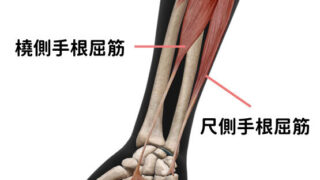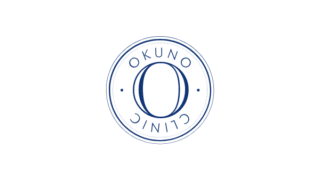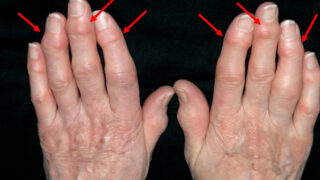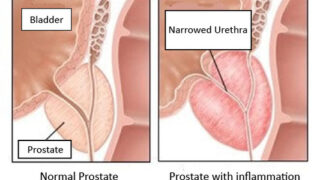สารบัญ
Q โรคไหล่ติดคืออะไร?
คุณเคยมีอาการปวดไหล่หรือรู้สึกตึงจนทำให้เคลื่อนไหวแขนได้ลำบากหรือไม่? หากใช่ คุณอาจกำลังเผชิญกับภาวะที่เรียกว่า โรคไหล่ติด หรือที่รู้จักกันในชื่อทางการแพทย์ว่า Adhesive Capsulitis
ที่คลินิกโอคุโนะ เรามักได้รับคำถามเกี่ยวกับวิธีการรับมือกับโรคไหล่ติด ภาวะนี้พบได้ในประชากรทั่วไปประมาณ 2-5% และอาจส่งผลกระทบต่อการใช้ชีวิตประจำวันได้มาก
ในบทความนี้ เราจะมาสำรวจเกี่ยวกับอาการ สาเหตุ และวิธีการรักษาโรคไหล่ติด รวมถึงการออกกำลังกายบางประเภทที่อาจช่วยบรรเทาความไม่สบายและอาการปวดได้
อาการของโรคไหล่ติด
อาการของโรคไหล่ติดมักจะค่อย ๆ พัฒนาและสามารถแบ่งออกเป็น 3 ระยะดังนี้:
- ระยะที่ 1: ระยะปวดและเริ่มติด (Freezing Stage)
ในระยะนี้ คุณอาจรู้สึกปวดตื้อ ๆ บริเวณไหล่ ซึ่งอาการจะค่อย ๆ แย่ลงตามเวลา ไหล่อาจเริ่มมีอาการติดแข็ง ทำให้การทำกิจวัตรประจำวันกลายเป็นเรื่องยาก - ระยะที่ 2: ระยะติดแข็ง (Frozen Stage)
ในระยะนี้ ไหล่อาจมีอาการติดแข็งมากขึ้นจนแทบไม่สามารถขยับได้เลย ระยะนี้อาจกินเวลาตั้งแต่ 4 ถึง 12 เดือน - ระยะที่ 3: ระยะฟื้นตัว (Thawing Stage)
ในระยะสุดท้ายนี้ คุณอาจเริ่มกลับมาขยับไหล่ได้บางส่วน แม้ว่าอาจต้องใช้เวลาหลายเดือนกว่าจะฟื้นตัวได้เต็มที่
ควรทราบว่าโรคไหล่ติดมักเกิดขึ้นกับไหล่ข้างเดียวเท่านั้น แต่อาจเกิดขึ้นกับไหล่ทั้งสองข้างได้ในบางกรณี
บางครั้งอาการปวดไหล่อาจเกิดขึ้นโดยไม่มีสาเหตุชัดเจน และอาการปวดสามารถค่อย ๆ เพิ่มขึ้นอย่างช้า ๆ หรือรวดเร็วภายในไม่กี่สัปดาห์หรือหลายเดือน ในระยะแรก อาจรู้สึกเพียงแค่ไม่สบายเล็กน้อยบริเวณไหล่ แต่ในหลาย ๆ กรณี อาการสามารถรุนแรงขึ้นได้ อาการปวดอาจแสดงออกชัดเจนแม้จะเคลื่อนไหวแขนหรือไหล่ตามปกติ ไม่ใช่เรื่องแปลกที่บางคนจะไม่สามารถนอนหลับได้นานเกิน 1-2 ชั่วโมงเนื่องจากความเจ็บปวด ซึ่งอาจยาวนานหลายเดือนถึง 1 ปีหรือมากกว่านั้น หลังจากได้รับการวินิจฉัยว่าเป็นโรคไหล่ติดในระยะรุนแรง
เมื่อระยะโรคดำเนินไป ความผิดปกติที่เรียกว่า พังผืดแข็งตัว (fibrosis) จะเกิดขึ้นในแคปซูลข้อต่อ ส่งผลให้ช่วงการเคลื่อนไหวของไหล่ลดลงอย่างมาก เป็นผลให้ผู้ป่วยอาจประสบกับอาการอื่น ๆ ตามมา เช่น ไม่สามารถถือของได้อย่างมั่นคง ใช้แรงบีบหรือออกแรงได้ยาก หรือแม้กระทั่งการพลิกตัวบนเตียง ซึ่งทำให้คุณภาพชีวิตลดลงอย่างเห็นได้ชัด
สาเหตุของโรคไหล่ติด
สาเหตุที่แท้จริงของโรคไหล่ติดยังไม่ทราบแน่ชัด อย่างไรก็ตาม มีปัจจัยเสี่ยงหลายประการที่อาจเพิ่มโอกาสในการเกิดภาวะนี้ ได้แก่:
- อายุ: โรคไหล่ติดพบได้บ่อยในผู้ที่มีอายุมากกว่า 40 ปี
- เพศ: ผู้หญิงมีแนวโน้มเป็นโรคไหล่ติดมากกว่าผู้ชาย
- การบาดเจ็บหรือการผ่าตัด: หากคุณเคยได้รับบาดเจ็บหรือเข้ารับการผ่าตัดที่ไหล่เมื่อไม่นานมานี้ คุณอาจมีความเสี่ยงสูงขึ้นที่จะเป็นโรคไหล่ติด
- ปัญหาสุขภาพอื่น ๆ: ภาวะสุขภาพบางอย่าง เช่น โรคเบาหวาน ปัญหาต่อมไทรอยด์ และโรคหัวใจ อาจเพิ่มความเสี่ยงในการเกิดโรคไหล่ติดได้
Q บุคคลประเภทใดที่มีแนวโน้มเป็นโรคไหล่ติดมากที่สุด?
โรคข้อไหล่อักเสบมักเกิดขึ้นหลังวัยกลางคน โดยประมาณว่าโรคนี้ส่งผลกระทบต่อประชากรประมาณ 2-5% และพบได้บ่อยเป็นพิเศษในผู้หญิงที่มีอายุระหว่าง 40 ถึง 60 ปี นอกจากนี้ ผู้ป่วยโรคเบาหวานมีแนวโน้มที่จะเป็นโรคไหล่ติดได้มากขึ้น โดยความถี่ของการเกิดโรคในกลุ่มนี้เพิ่มขึ้นเกือบ 10%
Q โรคไหล่ติดใช้เวลานานแค่ไหนในการรักษาให้หาย?
ภาวะไหล่ติดไม่สามารถรักษาให้หายได้ในทันที โดยทั่วไปจะใช้เวลาหลายเดือนเป็นอย่างน้อย และในกรณีที่รุนแรงที่สุดอาจใช้เวลาหลายปี มีรายงานว่า 30% ของผู้ป่วยยังคงมีอาการปวดหลงเหลืออยู่แม้เวลาจะผ่านไปนานถึง 7 ปี หากโรคมีความรุนแรง
โดยปกติแล้ว โรงพยาบาลมักเน้นการรักษาแบบตามอาการ เช่น การจ่ายยาบรรเทาปวดหรือยาแก้ปวด และปล่อยให้เวลาเป็นตัวช่วยในการรักษา นอกจากนี้ ยังมีการฉีดสเตียรอยด์เข้าไปในแคปซูลข้อไหล่เพื่อบรรเทาอาการ
เมื่อไม่นานมานี้ วิธีการรักษาที่เรียกว่า "การใส่สายสวนหลอดเลือดระบบกล้ามเนื้อและกระดูก" ได้รับความนิยมเพิ่มมากขึ้น เนื่องจากมีประสิทธิภาพในการรักษาภาวะไหล่ติดที่มีความรุนแรง หากคุณต้องการทราบข้อมูลเพิ่มเติมเกี่ยวกับวิธีการรักษานี้ โปรดเยี่ยมชมเว็บไซต์ของเราเพื่อดูรายละเอียดเพิ่มเติม
Q การรักษาโรคไหล่ติด
ข่าวดีคือโรคไหล่ติดส่วนใหญ่สามารถรักษาให้หายได้โดยไม่ต้องผ่าตัด วิธีการรักษาเหล่านี้รวมถึง:
- กายภาพบำบัด: นักกายภาพบำบัดสามารถสอนท่าบริหารเฉพาะที่ช่วยเพิ่มช่วงการเคลื่อนไหวของไหล่และบรรเทาอาการปวด
- การใช้ยา: ยาต้านการอักเสบที่ไม่ใช่สเตียรอยด์ (NSAIDs) ช่วยลดการอักเสบและบรรเทาอาการปวดได้
- การฉีดสเตียรอยด์: ในบางกรณี อาจแนะนำให้ฉีดคอร์ติโคสเตียรอยด์เพื่อลดการอักเสบและความเจ็บปวด
- การผ่าตัด: หากวิธีการรักษาแบบไม่ผ่าตัดไม่ได้ผล อาจจำเป็นต้องผ่าตัดเพื่อเอาพังผืดออกและฟื้นฟูการเคลื่อนไหวของไหล่
การออกกำลังกายสำหรับโรคไหล่ติด
นอกเหนือจากการรักษาข้างต้น การออกกำลังกายบางท่าสำหรับโรคไหล่ติดสามารถช่วยเพิ่มความยืดหยุ่นและบรรเทาอาการปวดได้ การออกกำลังกายเหล่านี้ประกอบด้วย:
- ท่าแกว่งแขน (Pendulum Stretch): ยืนเอนตัวไปข้างหน้า โดยใช้แขนข้างที่ไม่เจ็บพยุงตัวไว้บนโต๊ะ ปล่อยแขนข้างที่เจ็บห้อยลงและค่อย ๆ แกว่งเป็นวงกลมเล็ก ๆ โดยเพิ่มขนาดของวงกลมขึ้นทีละน้อย
- ท่าใช้ผ้าขนหนูดึงยืด (Towel Stretch): ถือผ้าขนหนูไว้ด้านหลังโดยใช้มือข้างหนึ่ง จากนั้นใช้มืออีกข้างจับปลายผ้าขนหนูอีกด้านหนึ่ง ค่อย ๆ ดึงผ้าขนหนูขึ้นด้านบนด้วยแขนข้างที่ดีเพื่อยืดแขนข้างที่มีปัญหา
- ท่าเดินนิ้วขึ้นกำแพง (Finger Walk): ยืนหันหน้าเข้าหากำแพง ใช้นิ้วมือค่อย ๆ เดินขึ้นไปบนผนังโดยให้ข้อศอกตรง
- ท่ายกแขนข้ามลำตัว (Cross-Body Reach): ใช้แขนข้างที่ดีประคองแขนข้างที่เจ็บตรงบริเวณข้อศอก แล้วยกขึ้นข้ามลำตัว ค้างไว้สักครู่แล้วค่อย ๆ ปล่อยลง
การปรึกษาแพทย์
โรคไหล่ติดอาจทำให้เกิดความเจ็บปวดและความไม่สะดวกในการใช้ชีวิตประจำวัน แต่ด้วยการรักษาที่เหมาะสมและการออกกำลังกายที่ถูกต้อง ผู้ป่วยส่วนใหญ่สามารถฟื้นตัวได้อย่างสมบูรณ์ หากคุณมีอาการปวดไหล่หรือไหล่ติด ควรปรึกษาผู้เชี่ยวชาญทางการแพทย์เพื่อรับการวินิจฉัยและการรักษาที่เหมาะสม
Author

-
-Dr. Yuji Okuno-
ฉันเริ่มต้นอาชีพในฐานะแพทย์รังสีวิทยาทางการแทรกแซง ซึ่งนำไปสู่การวิจัยเกี่ยวกับการสร้างหลอดเลือดผิดปกติในระหว่างการศึกษาปริญญาโท ในฐานะผู้เขียนหลัก ฉันได้เผยแพร่ผลการศึกษาที่เกี่ยวข้องกับยีนที่เกี่ยวข้องในวารสาร Nature Medicine ในปี 2012 จากงานวิจัยนี้ ฉันได้พัฒนาการรักษาด้วยการอุดหลอดเลือดแบบใหม่สำหรับโรคทางกล้ามเนื้อและกระดูกเรื้อรัง เช่น ข้อเข่าเสื่อมและไหล่แข็ง และเป็นคนแรกที่รายงานถึงความปลอดภัยและประสิทธิภาพของมัน แนวทางนี้กำลังได้รับการศึกษาระดับนานาชาติ
-Career-
2549-2552 นักศึกษาฝึกงาน, ภาควิชารังสีวิทยา, คลินิกา ET, โยโกฮาม่า, ญี่ปุ่น
2552-2555 นักวิจัย, ศูนย์วิจัยการแพทย์แบบบูรณาการ, มหาวิทยาลัยเคโอ, โตเกียว, ญี่ปุ่น
2555-2558 นักวิจัยคลินิก, ภาควิชารังสีวิทยาทางการแทรกแซง, โรงพยาบาลเอดะโงะ, โตเกียว, ญี่ปุ่น
2558-2560 ผู้อำนวยการ, ศูนย์แทรกแซงทางกระดูกและข้อ, โรงพยาบาลเอดะโงะ, โตเกียว, ญี่ปุ่น
2560- ปัจจุบัน ผู้อำนวยการสูงสุด, คลินิกโอกุโนะ, โตเกียว, ญี่ปุ่น
Latest posts
 Jan 21, 2026Golfer’s Elbow
Jan 21, 2026Golfer’s Elbow Sep 12, 2025โรคเกาต์ FAQ
Sep 12, 2025โรคเกาต์ FAQ Sep 12, 2025Heberdens Nodes FAQ
Sep 12, 2025Heberdens Nodes FAQ Feb 7, 2025Chronic prostatitis โรคต่อมลูกหมากอักเสบ
Feb 7, 2025Chronic prostatitis โรคต่อมลูกหมากอักเสบ